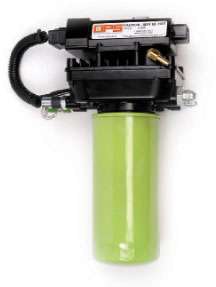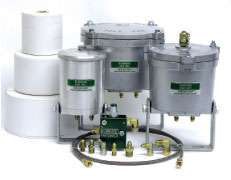Cleaning the oil
Should your fleet start fitting bypass filters?
Bypass filters have long been the standard way of cleaning engine oil. But in recent years, the marketplace has seen new technologies from upstart companies challenging conventional wisdom and claiming their filters will allow fleets to preserve or even lengthen engine life while extending oil change intervals.
 Oil Purification Systems filters warm the oil and allow liquid contaminants to evaporate as they pass through the system. OPS says its Eco-Pur design will control this process with electronics for greater precision.
Oil Purification Systems filters warm the oil and allow liquid contaminants to evaporate as they pass through the system. OPS says its Eco-Pur design will control this process with electronics for greater precision.While still a gray area, these radical approaches to managing change intervals gradually are gaining respectability. The Technology & Maintenance Council has endorsed a procedure for fitting bypass filters, which includes extending oil change intervals and keeping tabs on oil condition with regular oil analysis.
“Supplemental filtration systems will help equipment users maintain acceptable oil quality for an extended period of time as compared to operation without such a system,” TMC’s RP 359 reads. But how long can oil filtered down to tiny micron levels safely be left in an engine?
A bypass filter takes a limited amount of oil and filters it, then returns it to the sump. “This maintains a cleaner sump,” says Paul Bandoly, manager of technical services and customer training for Wix. “The bypass filter is like slow-pitch softball compared to a full-flow filter. It works at a much slower velocity of fluid flow, so it can catch much smaller contaminants. This is possible because it has a much tighter matrix.” Such a tight matrix would restrict flow too much for use in a full-flow filter, depriving the engine of oil or causing the filter medium to be bypassed.
Bypass filters are designed to draw about 3 to10 percent of the oil pump’s capacity at any one time and trap the small wear-causing contaminants that full-flow filters do not remove. “A bypass filter’s flow rate may only be 2 gallons per minute,” says Brent Birch, laboratory manager of Champion Laboratories. “However, it’s designed to clean the oil more thoroughly than the engine’s primary full-flow filter.”
The most damaging contamination particles are in the smaller 5- to 15-micron range, Birch says. “They get wedged between moving engine parts, resulting in engine wear.” By comparison, the standard full-flow filter traps particles from 15 to 40 microns, he says.
Choosing designs
Bypass filtration systems are available in two designs: Bypass filters in a separate housing with separate plumbing, and combination filters that incorporate a bypass filter in the same housing with a full-flow filter.
The combination-type filters have an advantage, says Gary Spires of Cummins Filtration. Cummins’ larger engines use a combination bypass and full-flow filter in which a Venturi design pulls oil through the stacked discs of the bypass section so that flow to the oil pan isn’t lost, which would lead to lost power. Other manufacturers, including Wix and LuberFiner, offer filters with a similar basic design, though the Venturi design is patented by Cummins Filtration.
A traditional bypass filter is mounted externally, removes a percentage of the flow headed for the engine’s internal parts from an oil gallery and returns the filtered oil to the pan. When choosing and installing a bypass filter, fleets should check with their engine makers about maintaining adequate oil supply for the engine.
When Cummins mounted its combination filter on the original versions of its ISX engines, the company lent new respectability to bypass filtration. “A bypass filter’s real value is reduction of major component replacement at time of overhaul,” Spires says. Fleets using bypass filtration are likely to save the camshaft, followers and drive gears when they normally would need to be replaced, he says.
Radical approaches to managing change intervals are gaining respectability.
Several aftermarket companies offer super-fine bypass filters that make oil flow at a fraction of that allowed by combination bypass filters. Oil Purification Systems offers a system that allows flows of about 2 to 3 gallons per hour, says Tom Bock, director of technical sales.
 Kleenoil USA says its filters offer more filtration capacity and therefore a longer change interval for the filter itself.
Kleenoil USA says its filters offer more filtration capacity and therefore a longer change interval for the filter itself.National Carriers says it uses filters from Filtration Solutions Worldwide to extend its oil drains from 15,000 to 20,000 miles to 120,000. “Our initial goal is to prolong the engine life of our older equipment,” says Ed Kentner, leasing director of National Carriers. “Our secondary goal is to reduce the cost of regular oil changes.”
National Carriers monitors oil condition monthly when the filters are changed and the housing is refilled with fresh oil. “We are only changing oil when recommended by the oil analysis or our maintenance supervisor,” Kentner says. National Carriers technicians installed the filters under the supervision of a trained Filtration Solutions technician.
Petroleum bulk carrier KAG West says it uses OPS filters to extend its CJ-4 mineral lube drains from 20,000 to 120,000 miles. OPS filters warm the oil and give liquid contaminants a chance to evaporate as they pass through the system. Later this year, OPS will be introducing its Eco-Pur design, which controls this process with electronics for greater precision.
Who’s right?
 This is an exploded view of the Wix XD, a combination full-flow and bypass filter.
This is an exploded view of the Wix XD, a combination full-flow and bypass filter.Other aftermarket bypass filter manufacturers agree that using their filters can extend oil change intervals almost indefinitely. However, engineering staffs at major engine oil refiners disagree. So who is ultimately right?
Bandoly says there is some evidence that soot removal prolongs the life of oil additives. “If the bypass filter gets clogged, TAN (total acid number) increases,” he says. “But remember that the science isn’t fully understood yet. So unless you want your engines to be part of an experiment, you need to proceed carefully.”
Most bypass manufacturers say their customers should conduct laboratory oil analysis frequently and rely on those tests to decide when to change their oil. Additional checks – such as periodically removing the cam cover when doing overheads, and inspecting the cylinder head top surface for deposits – also can prove helpful when deciding whether oil can be used for more miles.
Because of the way engine parts and controls are evolving in complexity, increased attention to oil cleanliness is a must, and Bandoly recommends a conservative approach. Still, trying a bypass filter on a few trucks and taking “baby steps” in extending change intervals while monitoring oil condition might prove to be another way to cut costs. n











